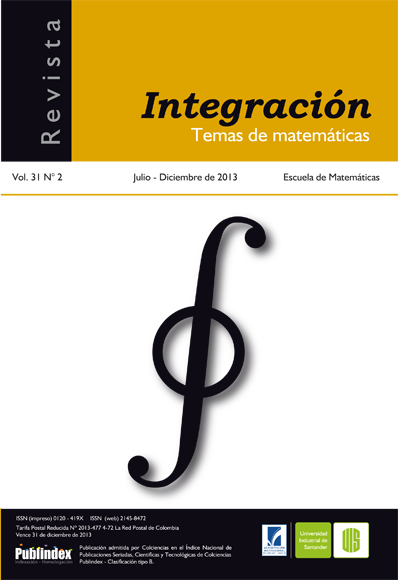Research and Innovation Articles
Published 2013-12-17
Keywords
- Conditional expectation,
- conditional independence
How to Cite
Marmolejo L., M. A., & Muñoz-Tello, A. F. (2013). Some properties of conditional independence. Revista Integración, Temas De matemáticas, 31(2), 165–180. Retrieved from https://revistas.uis.edu.co/index.php/revistaintegracion/article/view/3755
Abstract
The aim of this paper is to establish some new properties of the conditional independence of a family of classes of events. On the one hand, we generalize some of the results by Van Putten and Van Schuppen [15], who considered the case of families with two elements, and, on the other hand, we generalize known results on independents families of classes of events. As an application, we give some properties of the conditional independence in a family of random variables.
Downloads
Download data is not yet available.
References
[1] Ash R.B. and Dolèans-Dade C.A., Probability and Measure Theory, Second Edition, Academic Press, San Diego, 2000.
[2] Bauer H., Probability Theory, Walter de Guyter, New York, 1972.
[3] Basu D. and Pereira C.A.B., “Conditional independence in statistics”, Sankhy¯a Ser. A 45 (1983), no. 3, 324–337.
[4] Billingsley P., Probability and Measure, Jhon Wiley and Sons. Inc., New York, 1979.
[5] Grzenda W. and Zieba W., “Conditional Central Limit Theorems”, Int. Math. Forum 3 (2008), no. 31, 1521–1528.
[6] Jamison B., “Reciprocal processes: the stationary Gaussian case”, Ann. Math. Statist. 41 (1970), no. 5, 1624–1630.
[7] Loève M., Probability Theory II, Four Edition, Springer-Verlag, New York, 1978.
[8] Majerek D., Nowak W. and Zieba W., “Conditional Strong Law of Large Number”, Int. J. Pure and Appl. Math. 20 (2005), no. 2, 143–156.
[9] Majerek D. and Zieba W., “Conditional Martingales”, Acta Math. Vietnam. 32 (2007), no. 1, 41–50.
[10] Majerek D. and Zieba W., “Conditional Version of Marcinkiewicz-Zygmunt’s Theorem”, Int. Math. Forum 3 (2008), no. 25, 1233–1240.
[11] Nogales A.G. and Oyola J.A., “Some remarks on sufficiency, invariance and conditional independence”, Ann. Statist. 24 (1996), no. 2, 906–909.
[12] Nogales A.G., Oyola J.A. and Pérez P., “On conditional independence and the relationship between sufficience and invariance under the Bayesian point of view”, Statist. Probab. Lett. 46 (2000), no. 1, 75–84.
[13] Nualart D., The Malliavin Calculus and Related Topics, Springer-Verlag, New York, 1995.
[14] Prakasa Rao B.L.S., “Conditional independence, conditional mixing and conditional association”, Ann. Inst. Statist. Math. 61 (2009), no. 2, 441–460.
[15] Van Putten C. and Van Schuppen J.H., “Invariance properties of the conditional independence relation”, Ann. Probab. 13 (1985), no. 3, 934–945.
[16] Roussas G., “On conditional independence, mixing, and association”, Stoch. Anal. Appl. 26 (2008), no. 6, 1274–1309.
[17] Shiryaev A.N., Probability, Second Edition, Springer, New York, 1996.
[18] Williams D., Probability with Martingales, Cambridge University Press, Cambridge, 1997.
[2] Bauer H., Probability Theory, Walter de Guyter, New York, 1972.
[3] Basu D. and Pereira C.A.B., “Conditional independence in statistics”, Sankhy¯a Ser. A 45 (1983), no. 3, 324–337.
[4] Billingsley P., Probability and Measure, Jhon Wiley and Sons. Inc., New York, 1979.
[5] Grzenda W. and Zieba W., “Conditional Central Limit Theorems”, Int. Math. Forum 3 (2008), no. 31, 1521–1528.
[6] Jamison B., “Reciprocal processes: the stationary Gaussian case”, Ann. Math. Statist. 41 (1970), no. 5, 1624–1630.
[7] Loève M., Probability Theory II, Four Edition, Springer-Verlag, New York, 1978.
[8] Majerek D., Nowak W. and Zieba W., “Conditional Strong Law of Large Number”, Int. J. Pure and Appl. Math. 20 (2005), no. 2, 143–156.
[9] Majerek D. and Zieba W., “Conditional Martingales”, Acta Math. Vietnam. 32 (2007), no. 1, 41–50.
[10] Majerek D. and Zieba W., “Conditional Version of Marcinkiewicz-Zygmunt’s Theorem”, Int. Math. Forum 3 (2008), no. 25, 1233–1240.
[11] Nogales A.G. and Oyola J.A., “Some remarks on sufficiency, invariance and conditional independence”, Ann. Statist. 24 (1996), no. 2, 906–909.
[12] Nogales A.G., Oyola J.A. and Pérez P., “On conditional independence and the relationship between sufficience and invariance under the Bayesian point of view”, Statist. Probab. Lett. 46 (2000), no. 1, 75–84.
[13] Nualart D., The Malliavin Calculus and Related Topics, Springer-Verlag, New York, 1995.
[14] Prakasa Rao B.L.S., “Conditional independence, conditional mixing and conditional association”, Ann. Inst. Statist. Math. 61 (2009), no. 2, 441–460.
[15] Van Putten C. and Van Schuppen J.H., “Invariance properties of the conditional independence relation”, Ann. Probab. 13 (1985), no. 3, 934–945.
[16] Roussas G., “On conditional independence, mixing, and association”, Stoch. Anal. Appl. 26 (2008), no. 6, 1274–1309.
[17] Shiryaev A.N., Probability, Second Edition, Springer, New York, 1996.
[18] Williams D., Probability with Martingales, Cambridge University Press, Cambridge, 1997.
